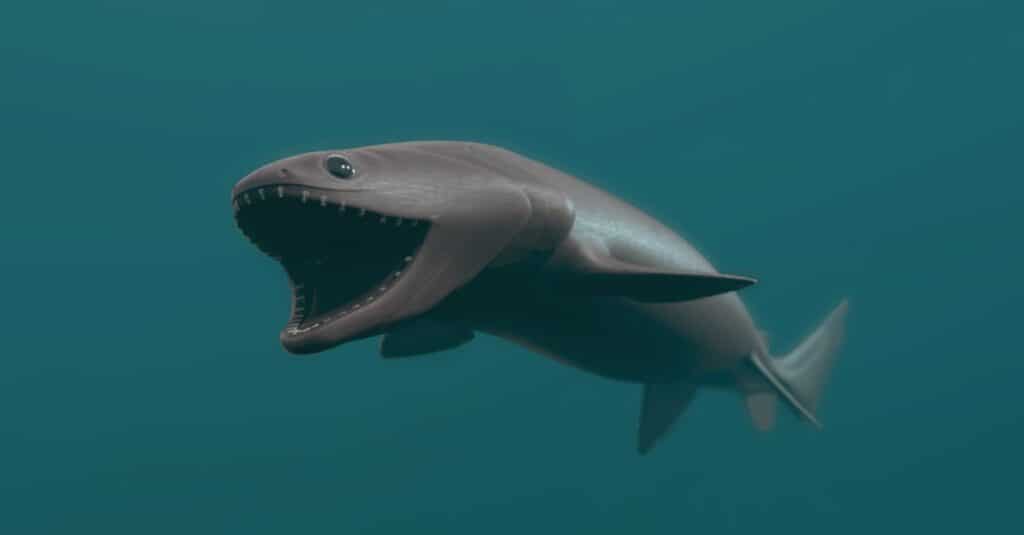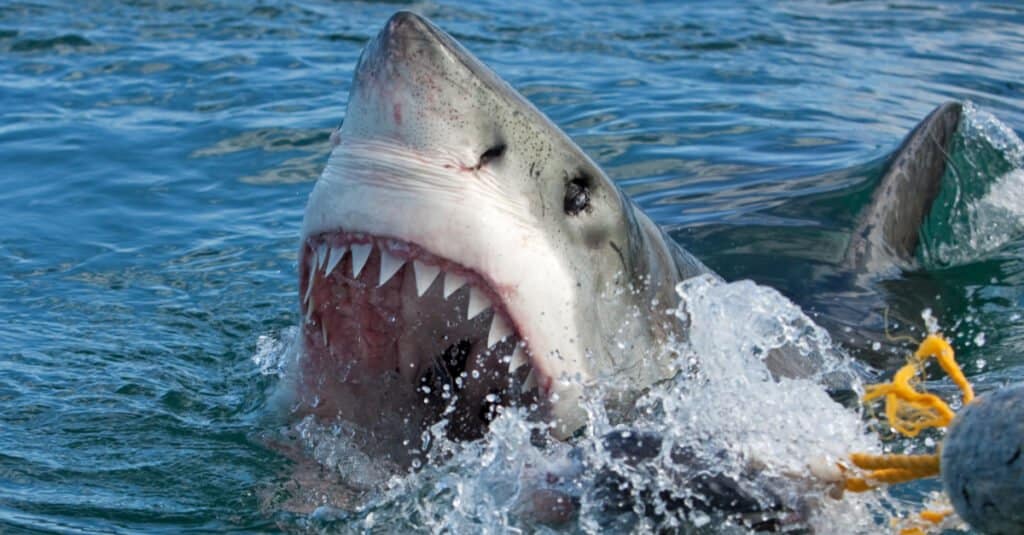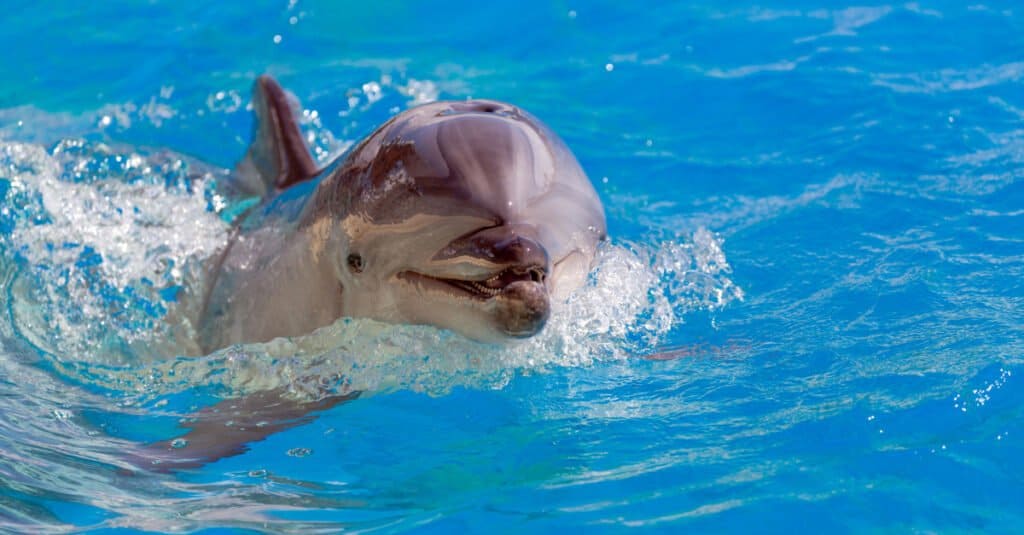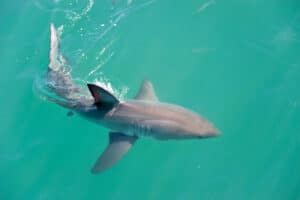Sharks have a reputation for being ruthless and being able to take down almost any prey because of their size. While it is true that sharks are on top of their food chain, they do not attack animals at random. Thus, a shark’s diet consists mainly of fish, turtles, and seals or planktons. This diet varies according to whether the shark mostly eats flesh (carnivorous) or planktons (planktivorous).
Now, carnivorous sharks typically hunt or grab any sea creature that can fit in their mouths. So, big fish, including other sharks, octopuses, or dolphins, may be on the menu depending on how big a shark is. If you are wondering if sharks eat dolphins, find that out in the rest of this article.
Do Sharks Eat Dolphins?

As opportunistic predators, sharks occasionally go after young dolphins and eat them.
©iStock.com/3dsam79
Yes, sharks eat dolphins. Sharks are opportunistic predators who prey on most sea animals. They also happen to be at the top of the food chain, which means carnivorous sharks will tackle almost any fish that is smaller than them, including young dolphins.
Although there are many instances of shark attacks on dolphins, it’s not very common. Most sharks would rather go for other prey like smaller fish than large dolphins. Occasionally, hungry sharks will only go after smaller dolphins when hungry. It’s much easier to attack and subdue a juvenile or a sick dolphin than a fully grown one.
Dolphins move together in groups, called pods. So, sharks often move in groups to ambush their prey from underneath. Since large sharks weigh far more than most dolphins, they can swallow or devour their prey whole.
Do Great White Sharks Eat Dolphins?

Like all sharks, great white sharks eat dolphins.
©Martin Prochazkacz/Shutterstock.com
Great white sharks eat dolphins, other fishes, turtles, and seals. Dolphins are prey animals to many shark species, including tiger sharks, bull sharks, and great white sharks. These sharks are carnivores who target weak or young dolphins and eat them.
In a research on the interactions between sharks and dolphins, it was discovered that great whites often attack bottlenose dolphins in particular. Several dolphins in the Moreton Bay area were found with healing wounds that matched shark attacks. These sharks are known to ambush dolphins, bite them and swim around, waiting for them to bleed to death or weaken enough to be devoured quickly.
Generally, great whites are pretty opportunistic and eat almost anything, including stolen prey from smaller whites. There’s even video footage of a large great white stealing a dolphin from a smaller great white. The smaller fish had captured its prey (a dolphin) and was soon attacked by an even bigger great white who made off with the dolphin.
Are Sharks Scared of Dolphins?
Sharks can easily take down a single dolphin, but large groups of dolphins scare them off. Pods have been known to go after lone sharks and kill them. So, while a single dolphin does not pose a threat to sharks, they will most likely stay away from large groups.
Dolphins are intelligent fighters. Their understanding of their opponent’s weakness helps them fight well. So, dolphins are definitely not scared of sharks. Even a hungry shark is no match for a pod.
How Do Dolphins Fight Sharks?

Because sharks have soft underbellies, a hit from a dolphin’s snout can result in a fatal injury.
©Lefteris Papaulakis/Shutterstock.com
Dolphins use their snouts to aim for the soft underbellies of sharks. Their strength is in their numbers, as well as their intelligence.
Dolphins fight off sharks by using their speed and large numbers. Being highly social animals, they always move in groups and stay in touch with nearby dolphins. A pod can contain up to 20 dolphins, and sometimes pods gather with other pods and become even larger! Dolphins use their numbers to protect their young and the weak. When they sense danger, they communicate by emitting sounds to warn others.
Most sharks will turn away from large groups of dolphins. It is difficult for sharks to pick off a dolphin from its group. So, dolphins can usually discourage nearby sharks by their large numbers. Also, the body structure of dolphins helps them swim faster than sharks. However, younger dolphins can’t swim as fast as the older ones. And this makes them vulnerable to persistent sharks.
When hunting dolphins, sharks swim and attack from below. On the other hand, dolphins use echolocation to detect incoming danger, such as shark attacks. To do this, a dolphin will make a couple of loud pitches. When the pitches move through the water, they will bounce back once they hit an object, or in this case, a shark. Such dolphins may alert others nearby or swim far away from the shark’s direction.
But what happens when dolphins have to fight sharks? What happens is that the dolphin swims toward the shark and aims its snout at the shark’s stomach. Sharks have soft underbellies, and a hit from a dolphin’s snout can result in a fatal injury. If a shark gets attacked by other pod members, it could result in near-death injuries.
Do Dolphins and Sharks Get Along?
Dolphins and sharks do not get along. However, they come across each other quite often while searching for food. While a lone shark may trail and try to ambush a lone dolphin, the dolphin will do its best to avoid sharks. So, a fight between a shark and a dolphin will most likely be won by the shark. On the other hand, lone sharks often stay away from groups of dolphins, while the groups would attack any lone shark that comes in their path.
Do Dolphins Protect Humans From Sharks?
Dolphins are known to show kindness and affection to human beings. So, it’s not unusual to hear or read stories of dolphins rescuing humans from shark attacks at sea.
Dolphins fend off sharks by moving in groups. Between 2004 and 2007, a group of dolphins was seen swimming around humans and guiding them away from predatory Great Whites.
The photo featured at the top of this post is © Tomas Kotouc/Shutterstock.com
Thank you for reading! Have some feedback for us? Contact the AZ Animals editorial team.






